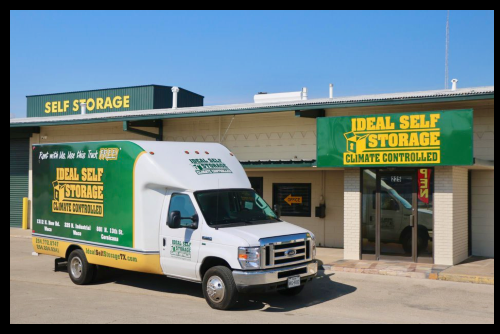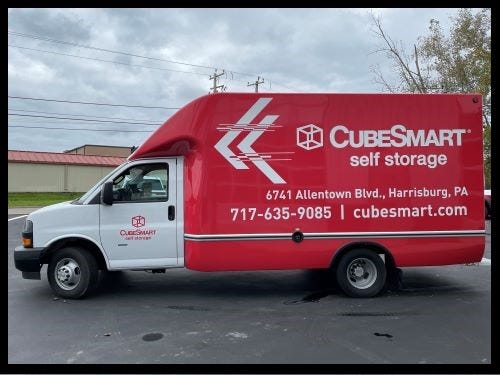The Right Road? How to Determine if Truck Rentals Are Viable for Your Self-Storage Business
Adding a truck-rental business to complement your self-storage operation can be a lucrative venture, but it requires careful consideration and commitment. This article provides guidance to help you determine if rental trucks are a viable option for your business, plus insight to revenue potential, maintenance and staff training.
December 22, 2023

Launching a truck-rental service to complement your self-storage business can be a lucrative venture, but to do it right, it’s imperative that you conduct thorough market research, develop a solid business plan, and be prepared to invest in maintaining and expanding your fleet. You need to consider important factors like insurance, licensing, routine maintenance and overhead costs. You’ll also need to offer exceptional customer service and promote your offering effectively.
To gauge whether trucks would be a good fit for your operation, it’s helpful to consider general pros and cons. On the positive side, a rental program can provide a consistent, predictable revenue stream. There’s scalability, meaning you can start with a small fleet and gradually expand as your business grows. The product attracts a diverse customer base, and demand is relatively constant, even during economic downturns. Finally, you can mix in ancillary products such as moving equipment to increase revenue.

On the other hand, drawbacks include high initial costs. You’ll need to purchase or lease one or more vehicles, invest in insurance, and be prepared to manage regular maintenance and repairs. The truck-rental market can also be competitive, with established players and national brands dominating the industry. Demand fluctuates, often increasing during the summer moving season and dropping in the winter. Plus, managing a fleet of vehicles and coordinating rentals can be challenging, though there’s software available to help you navigate.
Now that you know the general benefits and disadvantages, let’s look at feasibility, revenue potential, maintenance and staff training.
Feasibility
Before starting a truck-rental program at your self-storage facility, it’s crucial to conduct a comprehensive feasibility study to ensure the path is viable. To begin, identify your target market including individuals, businesses, contractors and event organizers. When considering demand, look for data on moving trends, construction projects and events that might require transportation. Analyze existing truck-rental businesses in your area to gauge the competition and understand their services, pricing and customer base. Don’t forget about local population, economic activity and growth prospects.
Next, create a detailed business plan that outlines your goals, target market, pricing strategy, marketing plan and financial projections. This should include a startup budget, ongoing expenses and revenue projections. You’ll need to determine the size and types of trucks you want to offer based on market demand (thinking about short- and long-term rental options), then calculate the initial investment required to lease or purchase them. You’ll also want to estimate ongoing expenses such as insurance, fuel, maintenance and marketing. Then project your rental rates and expected customer use to estimate your monthly and annual revenue.

Develop a plan to promote your new business. Consider online and offline advertising, partnerships with local businesses, and other strategies to attract customers. Create a strong brand identity to differentiate your offering from competitors. This can be accomplished with unique custom graphics for your trucks.
Finally, it’s helpful to seek advice from industry experts and professionals to ensure you’re prepared for all the potential challenges and opportunities. Consult with accountants, lawyers and other self-storage operators to confirm your business plan is sound.
Revenue Potential
The revenue potential for a truck-rental business in a self-storage environment can vary widely depending on your fleet size, pricing strategy, marketing effectiveness and customer demand. Location can also play a critical factor. High-population areas, cities with a lot of moving activity, and regions with robust commercial activities can offer more opportunity. To help you create estimates, here are some common fees charged by truck-rental businesses:
Rental: This is the core source of revenue. It can be charged on an hourly, daily, weekly or monthly basis.
Mileage: Charged in addition to the rental fee, this set fee per mile helps cover fuel costs and vehicle wear and tear.
Fuel: Rent each truck with a full tank of gas and require customers to return it in kind. If it comes back with less fuel, charge them for the cost of a refill.
Late returns: Charge this when the customer returns the truck later than the agreed-upon time. This encourages them to adhere to their lease and ensures the availability of the truck for the next renter.
Cleaning: This covers the cost of washing and detailing the vehicle.
Security deposit: Require this or run a pre-authorization on the customer’s credit card. The deposit is typically refundable upon the return of the truck in good condition.
Damages or repairs: Charge for these costs or deduct them from the customer’s deposit.
Additional equipment: Offer the option to rent moving blankets and hand dollies.
Special services: This includes things like vehicle drop-off and pick-up or after-hours availability.
Reservation: Charge this for booking a truck in advance, especially during peak moving seasons.
Cancellation: Implement a policy that allows you to charge a fee if a customer cancels their reservation within a certain timeframe.
Truck Maintenance
Regularly servicing your self-storage rental trucks is essential to ensure safety, reliability and longevity. Regular maintenance won’t only keep your fleet in good condition, it’ll prevent breakdowns and costly repairs. Here's an effective checklist:
Develop a maintenance schedule that outlines routine checks, inspections and servicing. Include daily, weekly, monthly and annual tasks.
Follow the manufacturer’s recommendations for oil changes, typically every 3,000 to 5,000 miles. Use the recommended oil grade.
Regularly inspect the brake pads and discs for wear and tear. Replace them as needed.
Change the transmission and differential fluids as recommended by the manufacturer or a professional mechanic.
Check the coolant level to ensure it has the right mix of water and antifreeze to prevent overheating and freezing.
Regularly inspect the suspension and steering components for signs of wear, looseness or damage.
Inspect the exhaust system for leaks and damage. Address any issues to prevent carbon monoxide from entering the cabin.
Check the battery, alternator and starter for proper operation. Make sure all electrical components are working correctly.
Rotate tires as recommended to ensure even wear. Align the wheels and balance the tires to prevent uneven wear and poor handling.
Perform routine checks before and after each rental. Encourage your team to report any issues promptly. In addition, schedule regular inspections by a certified mechanic to identify and address any hidden issues.
Maintain detailed records of all maintenance and repairs. Keep a log for each vehicle in your fleet.
Equip each truck with an emergency kit that includes basic tools, flares and other items that may be needed in case of a breakdown.
It’s important to follow the manufacturer’s recommendations for maintenance. Regular service won’t only keep your trucks safe and reliable, it’ll enhance their resale value when it’s time to retire them from your fleet.
Staff Training
Training your self-storage staff to effectively sell your truck-rental service is crucial to success. Begin by focusing on general service and sales skills. Your team should be courteous, helpful and attentive to customer needs. Encourage active listening to understand the renter’s requirements. Focus on basic sales techniques, such as building rapport with prospects, addressing objections and closing deals.
Make sure your team has a deep understanding of the vehicles you offer, including the various types and sizes available, their features, and any unique selling points. They must be familiar with all rental policies, including reservations, cancellations and late returns, as well as all applicable rental rates, fees, promotions or discounts. They should be prepared to answer questions, provide quotes and make reservations for inquiries that occur in-person, on the phone and via email.
Walk employees through the reservation process, from data collection to rental agreements to payment processing. They should be familiar and comfortable with any software or systems used for reservations and rentals. Train them to identify opportunities to upsell and cross-sell products and services, such as additional equipment rentals or insurance coverage. Finally, consider implementing incentives and rewards to motivate your staff. Recognition and performance-based bonuses can boost their motivation.
Training is an ongoing process, so periodically refresh and update your program to help stay competitive and adapt to changing customer needs and market conditions. Effective sales training not only helps increase revenue but also enhances the overall customer experience.
Get It Rolling
There are good reasons why truck rentals exist as a standalone business model, but as you can also see, there are many parallels and overlaps that make it an enticing and potentially lucrative addition to a self-storage operation. To leverage a program effectively requires careful planning and research, along with a commitment to proper execution and excellent customer service.
If you determine that your service area is viable to launch a truck-rental program and arm your staff with the sales and training tools to market and run it effectively, you stand to be rewarded with an additional revenue stream that you can rely on with confidence.
CJ Stratte is president and CEO of Boerne, Texas-based On The Move Inc., which offers a complete rental-truck program for self-storage operators. After more than two decades in the industry, including working at a storage facility, she has first-hand insight to the operator and customer experience and welcomes the opportunity to share tips for a successful program. To reach her, call 800.645.9949 or email [email protected].
About the Author(s)
You May Also Like





